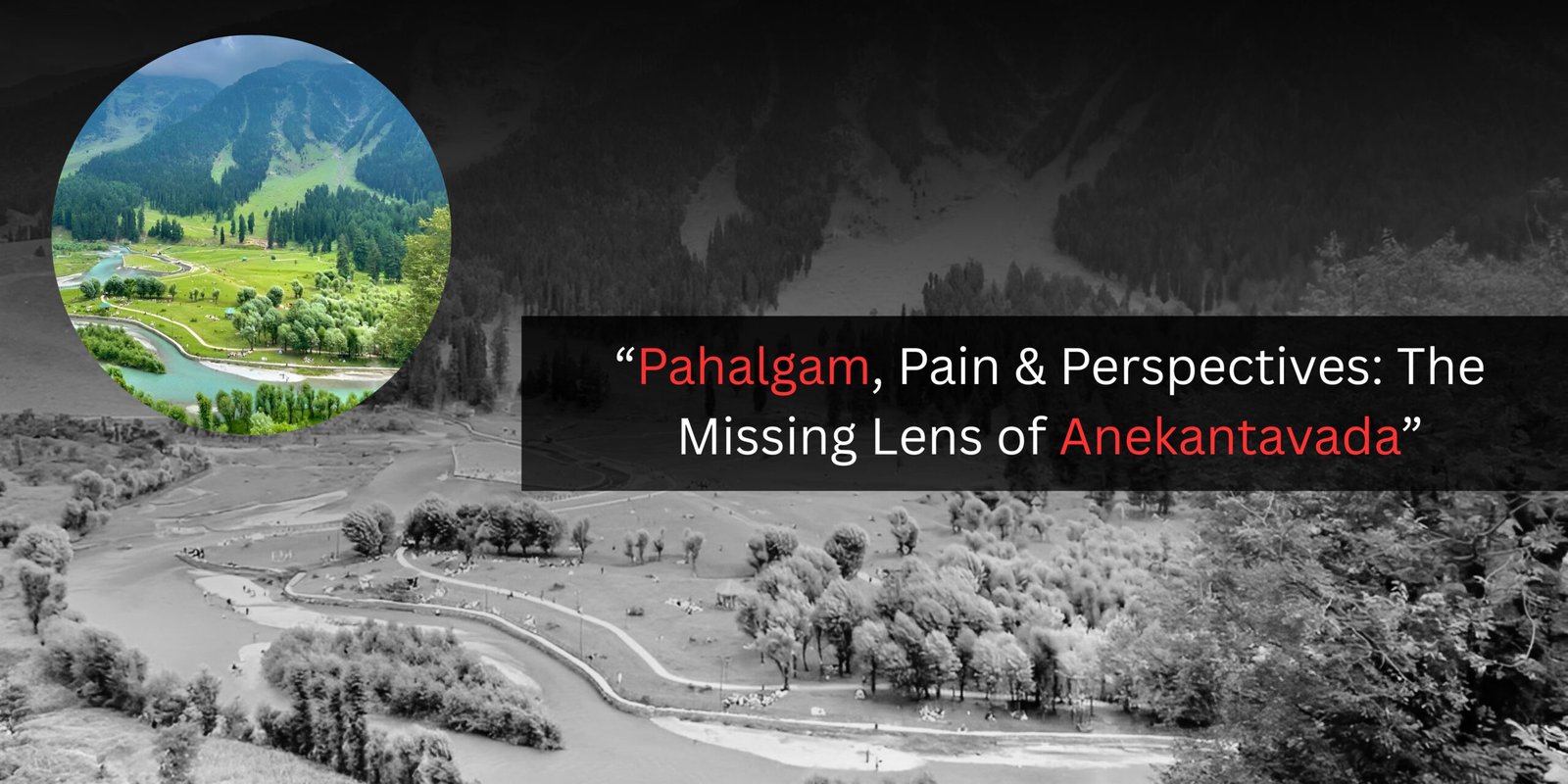In a world divided by voices, could ancient silence hold the solution?
Pahalgam: When Opinions Explode into Violence
From cancel culture storms on social media to shouting matches on primetime news—and now, to the shocking violence in Pahalgam, where lives were taken over ideological identity—one haunting question stares us in the face:
Pahalgam: How far will we go because we refuse to see the world through another’s eyes?
On April 22, 2025, a terror attack in the scenic town of Pahalgam wasn’t just an attack on people.
It was an attack on plurality—on the right to be different. Tourists were asked to prove their religion. Those who couldn’t were killed.
Why?
Because someone believed “Only my truth matters. Yours must be destroyed.”
This mindset isn’t new. We see it everywhere—online, in politics, in family WhatsApp groups, and even in classrooms. But what if we told you that a 2,500-year-old Jain philosophy holds the missing key to preventing such hatred?
That key is Anekantavada.
Jain: What Is Anekantavada?
Anekantavada (अनएकान्तवाद) means “non-one-sidedness.”
It doesn’t deny truth. It expands it.
It says truth is like a diamond—many facets, not just one. No single person, religion, ideology, or news channel holds all the truth.
One sees light. Another sees shadow. Anekantavada says: Both are right. Just from different angles.
Wherever it’s applied—in debates, relationships, religions—it cools the fire of absolutism.
And where it’s missing? That’s where sparks turn into flames.
Pahalgam: What If We Had Seen Through Anekantavada?
Let’s go back. What happened in Pahalgam wasn’t just about weapons—it began with one idea:
“My way is the only right way.”
It started in a mind that couldn’t accept difference.
If the attackers had believed even 1% that truth could wear different clothes, speak different prayers, or walk different paths—those lives could’ve been spared.
That’s where Anekantavada could have made the difference:
- Instead of judging by faith, they’d seek understanding.
- Instead of labeling “us” vs. “them”, they’d see shared humanity.
- Instead of acting out of ego, they’d act from empathy.
Anekantavada is not a spiritual idea locked in a temple.
It’s a daily discipline of perspective—and when applied, it can literally prevent hate turning into harm.
Terrorist attack: How Does This Apply to Us?
We may not carry guns, but many of us carry mental weapons:
Stereotypes. Snap judgments. Rage at those who “don’t get it.”
So let’s ask:
What if we brought Anekantavada into:
Aru Valley: Cancel Culture?
“He said one wrong thing—cancel him.”
Anekantavada says: “Let’s understand where it came from.”
Politics?
“If you vote for them, you’re the enemy.
Anekantavada says: “Maybe your fears and mine are both real.”
Family Debates?
“How can you believe that? You’re wrong.”
Anekantavada says: “Your story shaped your belief. I want to hear it.”
The Final Thought
We can’t undo the heartbreak of Pahalgam.
But we can prevent the next one—not just by more security, but by more sensitivity.
Let’s not wait for another tragedy to learn this.
Let’s live Anekantavada today—in our thoughts, in our tweets, in our tone.
Because truth has many sides.
And peace begins when we finally see them all.
What the world needs now isn’t just awareness—it’s Anekantavada.
And you can be its messenger.
Faq-
1. Q: What is the Pahalgam terror attack?
A: It was a recent act of violence in Kashmir’s Pahalgam region that shocked the nation and sparked debate on safety and unity.
2. Q: Why do such attacks happen in peaceful places like Pahalgam?
A: Conflicts often arise from deep-rooted issues like political tension, lack of understanding, and intolerance of differing views.
3. Q: What is Anekantvad and how does it relate to the attack?
A: Anekantvad is a Jain philosophy that teaches us to see every issue from many perspectives. It helps us respond with empathy, not hate.
4. Q: Can ancient values really help in today’s violent world?
A: Yes—values like nonviolence, empathy, and open-mindedness are timeless tools to build peace in a divided world.
5. Q: What can we do after such an attack—beyond anger and blame?
A: We can choose to be more compassionate, informed, and action-driven—promoting peace instead of hate.

